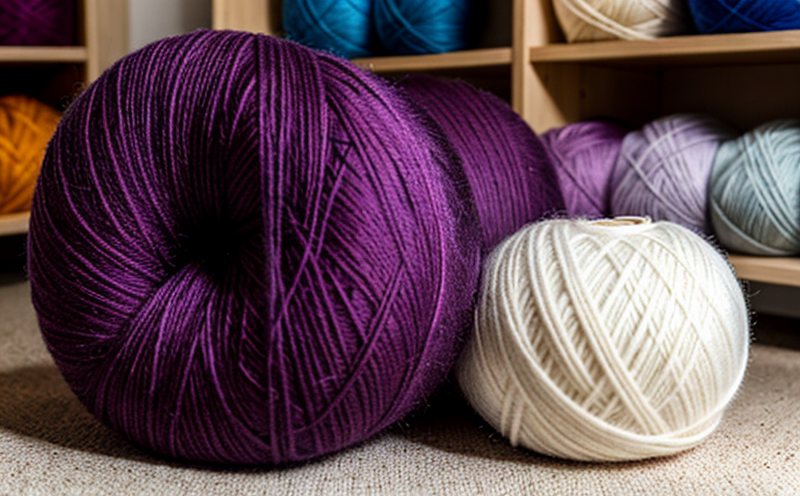NF EN ISO 2060 Détermination du Titre des Fils
The NF EN ISO 2060 standard is an internationally recognized method used to determine the weight per unit length of individual textile yarns. This service plays a crucial role in ensuring that textiles meet specific quality and performance criteria, which are essential for industries ranging from fashion and apparel to industrial manufacturing.
Accurate measurement of yarn fineness is critical as it affects the overall quality, strength, and durability of fabrics. The procedure outlined in NF EN ISO 2060 involves several steps that ensure precision and consistency across different types of textile fibers. These steps include selecting appropriate specimens, preparing them for testing, using specialized instruments to measure weight, and recording results according to international standards.
The process begins with obtaining a representative sample from the batch or production run being tested. It is important to note that the chosen samples should reflect typical characteristics of the entire lot to avoid bias in measurements. After selecting suitable specimens, they must be cut into specific lengths as per the requirements laid out by NF EN ISO 2060. Once prepared, these sections are placed on a balance capable of measuring small weights accurately.
For accurate results, it is also necessary to account for factors like environmental conditions such as temperature and humidity during testing. Any variations in these parameters may lead to inaccuracies in the final readings obtained from the instrument used. Therefore, maintaining controlled laboratory environments where tests are conducted helps ensure reliable outcomes.
The NF EN ISO 2060 method specifies how to calculate yarn fineness based on the mass of a given length of yarn expressed as grams per kilometer (g/km). This value provides valuable information about the nature and composition of textile fibers, helping manufacturers tailor their products according to market demands or regulatory requirements.
Understanding the significance of NF EN ISO 2060 goes beyond just compliance with legal regulations; it contributes significantly towards enhancing product quality across various sectors. By adopting this standard in yarn testing processes, companies can improve customer satisfaction by delivering consistent and high-quality materials that meet specific performance expectations set forth by industry standards.
Implementing NF EN ISO 2060 ensures consistency in production methods while promoting transparency throughout supply chains. This increases trust between suppliers and buyers who rely on accurate data when making purchasing decisions.
Scope and Methodology
The scope of this service includes the determination of weight per unit length for individual textile yarns following NF EN ISO 2060 guidelines. This process involves several key steps aimed at ensuring accuracy and reliability in measuring yarn fineness.
- Selecting representative samples from production batches
- Preparing specimens according to specified dimensions
- Using precision balances capable of weighing small quantities
- Calculating results based on predefined formulas within NF EN ISO 2060
The methodology employed during testing adheres strictly to international norms, ensuring comparability and reproducibility across different laboratories worldwide. Compliance with these standards enhances trustworthiness among stakeholders involved in the textile industry.
It is essential for those responsible for quality control within organizations to understand both the scope of this service as well as its underlying methodology fully. This knowledge allows them to make informed decisions regarding material selection, process optimization, and regulatory compliance.
Competitive Advantage and Market Impact
The ability to accurately measure yarn fineness using NF EN ISO 2060 offers significant competitive advantages in the textile industry. By adhering strictly to this standard, companies demonstrate their commitment to delivering high-quality products that meet international standards.
This commitment translates into enhanced reputation and credibility among customers who value consistency in material quality. In addition, compliance with these stringent testing protocols helps businesses stay ahead of competitors by ensuring they adhere to evolving industry trends and consumer preferences.
From an operational perspective, implementing NF EN ISO 2060 promotes efficiency within production processes through standardized procedures for sample preparation and testing. This leads to reduced waste and improved resource utilization rates, ultimately contributing to cost savings for manufacturers.
In the broader market context, adopting this standard fosters a culture of innovation by encouraging continuous improvement in product development efforts. As regulations change or new technologies emerge, staying aligned with internationally recognized standards ensures that companies remain adaptable and resilient in dynamic market conditions.
Use Cases and Application Examples
In fashion design, precise measurement ensures that fabrics have consistent thicknesses across different styles, enhancing wearability and comfort.
For industrial applications like conveyor belts or ropes, accurate yarn fineness guarantees durability under heavy loads without compromising safety standards.
In home furnishing products such as carpets or curtains, appropriate yarn selection improves insulation properties while maintaining aesthetic appeal.
Textile research and development benefit from consistent measurement practices enabling developers to experiment with new materials confidently knowing that their findings will be reliable across multiple trials.
The versatility of NF EN ISO 2060 allows it to serve various sectors within the broader textile industry. Its application spans from high-end luxury goods to mass-produced consumer items, ensuring uniformity and quality throughout every step of the manufacturing process.





